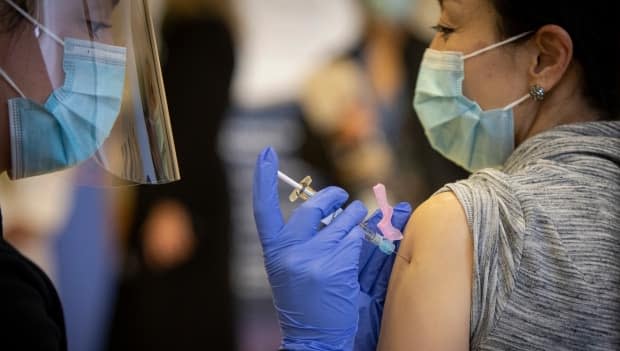Variants will likely make up 40% of Ontario's COVID-19 cases by mid-March, modelling predicts

Ontario's public health measures have decreased COVID-19 transmission and have slowed the spread of variants of concern, according to modelling released by the province's advisory group on Thursday.
But that good news comes with a caveat. According to the science table, variants of concern like B117 are continuing to spread and cases, hospitalizations and ICU admissions will likely increase soon.
Still, the province's latest projections come with a less dire tone than in recent weeks, with a smattering of positive news among warnings to remain vigilant. The full document appears at the bottom of this story.
For one, the data suggests that lockdowns and focused vaccination in long-term care homes have rapidly reduced infections and deaths in those facilities. Doctors also predict the pandemic will likely recede again in the summer.
But there are troubling statistics too. Ontario's overall test positivity rate was at 3.1 per cent on Feb. 20, but Peel Region was much higher at 7.1 per cent, as was Toronto at 5.6 per cent and York Region at 5.3 per cent.
Dr. Adalsteinn Brown, co-chair of Ontario's science advisory group, said "care" and "caution" are particularly critical in the next several weeks to help curb the rapid spread of variants of concern.
"The next few months are really key to maintaining our gains and to achieving a declining pandemic in the summer," Brown said.
"A better summer is in sight if we work for it now."
Variants of concern continue to spread quickly in Ontario, the data shows, and are projected to likely make up 40 per cent of the province's cases by the second week of March.
The science table says the next few weeks will be "critical" for understanding the impact of these variants, and that there "is a period of remaining risk" before the pandemic likely hits a lull in the summer months.
The modelling also noted a new milestone, with more than 1,886 deaths reported in the second wave, surpassing the 1,848 deaths in the first.
Number of active infections rises
Ontario reported another 1,138 cases of COVID-19 on Thursday, as the number of active infections provincewide increased for the first time in more than six weeks.
Brown said the new increase in the large public health units shows a trend in the wrong direction.
The upward climb was small — in total, there were just 21 more active cases Wednesday than on Tuesday (10,071 compared to 10,050) — but could be notable given that, until now, infections marked as resolved have outpaced newly confirmed cases every day since Jan. 12.
The new cases in Thursday's update include 339 in Toronto, 204 in Peel Region and 106 in York Region.
Thunder Bay also saw another 44 cases. The local medical officer of health there told CBC News that residents should prepare to go back into the grey "lockdown" phase of the province's colour-coded COVID-19 restrictions. Thunder Bay is currently in the third-strictest red "control" phase.
Other public health units that logged double-digit increases were:
Ottawa: 64.
Waterloo Region: 56.
Simcoe Muskoka: 44.
Halton Region: 40.
Hamilton: 37.
Windsor-Essex: 33.
Durham Region: 28.
Eastern Ontario: 20.
Brant County: 19.
Wellington-Dufferin-Guelph: 18.
Niagara Region: 12.
Southwestern: 11.
(Note: All of the figures used in this story are found on the Ministry of Health's COVID-19 dashboard or in its Daily Epidemiologic Summary. The number of cases for any region may differ from what is reported by the local public health unit on a given day, because local units report figures at different times.)
The seven-day average of new daily cases increased for a fifth straight day to 1,099.
Ontario's lab network completed 66,351 tests for SARS-CoV-2, the virus that causes COVID-19, and reported a test positivity rate of two per cent.
According to the province, there have been a total of 449 cases involving the coronavirus variant of concern first identified in the United Kingdom. That is 54 more than in yesterday's update. There have also been 11 cases of the variant first found in South Africa, and two linked to the variant identified in Brazil.
Researchers from the University of Guelph and University of Waterloo independently ran modelling simulations based on Ontario's most recent reopening plan, with stay-at-home orders possibly lifted in Toronto, Peel and North Bay-Parry Sound on March 8. The results suggest that the spread of the variant, which has been shown to be more contagious, could have profound effects on case numbers in latter half of March.
School-related cases
The Ministry of Education also reported another 83 school-related cases: 70 students, 12 staff members and one person who was not categorized. There are currently 18 schools closed due to the illness, about 0.4 per cent of those in the province.
In a news release issued late Wednesday, Toronto Public Health said that there are eight schools within the health unit where at least one case is, or is most likely, due to a variant of concern.
"The affected individuals and cohorts have been dismissed from school with guidance based on their level of risk. TPH has followed up with close contacts in affected class cohorts and has recommended testing," the release said.
Public health units also recorded the deaths of 23 more people with COVID-19, pushing Ontario's official toll to 6,916.
Meanwhile, the province said it administered 19,112 doses of vaccines yesterday, the second-most on a single day so far. As of 8 p.m. ET Wednesday, 255,449 people had received both shots of a vaccine.
WATCH | Ontario's vaccine rollout likely to be accelerated:

